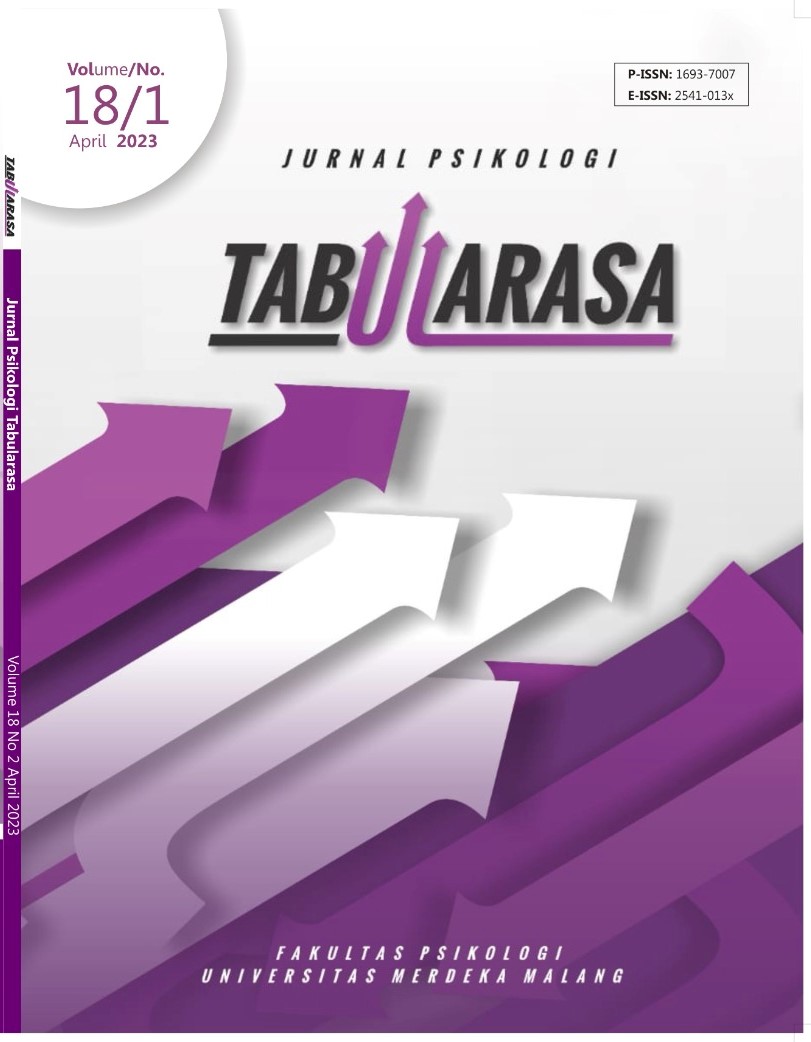The role of perceptions of inter-group conflict on religious radicalism: losing meaning as a mediator
DOI:
https://doi.org/10.26905/jpt.v18i1.9936Keywords:
Perceived intergroup conflict, loss of significance, religious radicalism, muslimAbstract
Indonesia as a country is still facing various kinds of national problems that have not been fully resolved. One of these problems is religious radicalism among some Muslims in this country. Examining the factors that trigger religious radicalism is thus an urgent and relevant scientific effort in Indonesia. To achieve this vision, this study aims to examine loss of significance as a mediator of the role of perceived intergroup conflict that pits Muslims against the West in explaining religious radicalism among some Muslims. This idea was tested using a correlational quantitative method with 201 Muslim participants. The results showed that, first, the higher the perceptions of conflict between Muslims and the West, the higher religious radicalism. Second, the perceived intergroup conflict increased loss of significance, and ultimately, loss of significance significantly explained the high levels of religious radicalism. Third, loss of significance mediated the positive relationship between perceived inter-group conflict and religious radicalism. The results of this study imply that religious radicalism is rooted in situational factors that strengthen individual motivation to support such an extreme, violent action.
Indonesia sebagai sebuah negara masih menghadapi berbagai macam masalah nasional yang belum sepenuhnya tertangani. Salah satu permasalahan tersebut adalah radikalisme agama di kalangan sebagian Muslim di negeri ini. Meneliti faktor-faktor yang memantik radikalisme agama dengan demikian merupakan sebuah upaya ilmiah yang urgen dan relevan di Indonesia. Untuk mencapai visi tersebut, penelitian ini bertujuan menguji kehilangan makna (loss of significance) sebagai mediator peran persepsi konflik antar kelompok dalam menjelaskan radikalisme agama di kalangan sebagian Muslim. Ide ini diuji menggunakan metode kuantitatif korelasional  dengan partisipan Muslim berjumlah 201. Hasil penelitian menunjukkan bahwa, pertama, semakin tinggi persepsi konflik antara Muslim dan pihak Barat maka semakin tinggi radikalisme agama. Kedua, persepsi konflik antar kelompok tersebut meningkatkan kehilangan makna, dan kehilangan makna selanjutnya secara signifikan menjelaskan tingginya radikalisme agama. Ketiga, kehilangan makna berperan signifikan sebagai mediator hubungan positif antara persepsi konflik antar kelompok dan radikalisme agama. Hasil penelitian ini mengimplikasikan bahwa radikalisme agama bermuara pada faktor situasional yang memperkuat motivasi individu untuk mendukung tindakan ekstrim tersebut.
Downloads
References
Adam-Troian, J., Baidada, O., Arciszewski, T., Apostolidis, T., Celebi, E., & Yurtbakan, T. (2019). Evidence for indirect loss of significance effects on violent extremism: The potential mediating role of anomia. Aggressive Behavior, 45(6), 691-703. https://doi.org/10.1002/ab.21863
Anwar, C. (2018). Islam Dan Kebhinekaan Di Indonesia: Peran Agama Dalam Merawat Perbedaan. Zawiyah: Jurnal Pemikiran Islam, 4(2), 1-18. http://doi.org/10.31332/zjpi.v4i2.1074
Barton, G., Vergani, M., & Wahid, Y. (2021). Santri with attitude: Support for terrorism and negative attitudes to non-Muslims among Indonesian observant Muslims. Behavioral Sciences of Terrorism and Political Aggression, 1-15. https://doi.org/10.1080/19434472.2021.1944272
Brylka, A., Jasinskaja-Lahti, I., & M€ahonen, T. A. (2016). The majority influence on interminority attitudes: The secondary transfer effect of positive and negative contact. International Journal of Intercultural Relations, 50, 76–88. https://doi.org/10.1016/j.ijintrel.2015.12.007
Crisp, R. J., & Beck, S. R. (2005). Reducing intergroup bias: The moderating role of ingroup identification. Group Processes & Intergroup Relations, 8(2), 173-185. https://doi.org/10.1177/1368430205051066
Cuddy, A. J. C., Fiske, S. T., & Glick, P. (2007). The BIAS map: Behaviors from intergroup affect and stereotypes. Journal of Personality and Social Psychology, 92(4), 631–648. https://doi.org/10.1037/0022-3514.92.4.631
Doosje, B., Moghaddam, F. M., Kruglanski, A. W., De Wolf, A., Mann, L., & Feddes, A. R. (2016). Terrorism, radicalization and de-radicalization. Current Opinion in Psychology, 11, 79-84. https://doi.org/10.1016/j.copsyc.2016.06.008
Farhadi, A. (2022). Post-9/11 radicalization theory and its impact on violent extremism. In A. J. Masys (Ed.), Handbook of Security Science (pp. 123-148). Springer Cham.
Fiske, S. T. (2002). What we know now about bias and intergroup conflict, the problem of the century. Current Directions in Psychological Science, 11(4), 123-128. https://doi.org/10.1111/1467-8721.00183
Gaertner, S. L., & Dovidio, J. F. (2014). Reducing intergroup bias: The common ingroup identity model. Psychology Press.
Gaunt, R. (2011). Effects of intergroup conflict and social contact on prejudice: The mediating role of stereotypes and evaluations. Journal of Applied Social Psychology, 41(6), 1340-1355. https://doi.org/10.1111/j.1559-1816.2011.00762.x
Harinck, F., & Druckman, D. (2017). Do negotiation interventions matter? Resolving conflicting interests and values. Journal of Conflict Resolution, 61(1), 29-55. https://doi.org/10.1177/0022002715569774
Hayes, A. F. (2017). Introduction to mediation, moderation, and conditional process analysis: A regression-based approach. Guilford publications.
Jasko, K., LaFree, G., & Kruglanski, A. (2017). Quest for significance and violent extremism: The case of domestic radicalization. Political Psychology, 38(5), 815-831. https://doi.org/10.1111/pops.12376
Kruglanski, A. W., & Bertelsen, P. (2020). Life psychology and significance quest: a complementary approach to violent extremism and counter-radicalisation. Journal of Policing, Intelligence and Counter Terrorism, 15(1), 1-22. https://doi.org/10.1080/18335330.2020.1725098
Kruglanski, A. W., Bélanger, J. J., Gelfand, M., Gunaratna, R., Hettiarachchi, M., Reinares, F., ... & Sharvit, K. (2013). Terrorism—A (self) love story: Redirecting the significance quest can end violence. American Psychologist, 68(7), 559-575. https://doi.org/10.1037/a0032615
Ludigdo, U., & Mashuri, A. (2021). Negative evaluations of national ethics and its impact on Islamic radicalism. SAGE Open, 11(3), 1-20. https://doi.org/10.1177/21582440211041099
Lyons-Padilla, S., Gelfand, M. J., Mirahmadi, H., Farooq, M., & Van Egmond, M. (2015). Belonging nowhere: Marginalization & radicalization risk among Muslim immigrants. Behavioral Science & Policy, 1(2), 1-12. https://behavioralpolicy.org/wp-content/uploads/2017/05/BSP_vol1is2_-Lyons-Padilla.pdf
Webber, D., Babush, M., Schori-Eyal, N., Vazeou-Nieuwenhuis, A., Hettiarachchi, M., Bélanger, J. J., ... & Gelfand, M. J. (2018). The road to extremism: Field and experimental evidence that significance loss-induced need for closure fosters radicalization. Journal of Personality and Social Psychology, 114(2), 270–285. https://doi.org/10.1037/pspi0000111
Mahfud, Y., & Adam-Troian, J. (2021). “Macron demission!â€: Loss of significance generates violent extremism for the Yellow Vests through feelings of anomia. Group Processes & Intergroup Relations, 24(1), 108-124. https://doi.org/10.1177/1368430219880954
Mashuri, A., & Osteen, C. (2023). Threat by Association, Islamic Puritanism and Conspiracy Beliefs Explain A Religious Majority Group’s Collective Protest Against Religious Minority Groups. Psychology and Developing Societies, 35(1), 169-196. https://doi.org/10.1177/09713336231152312
Mashuri, A., Akhrani, L. A., & Zaduqisti, E. (2016b). You are the real terrorist and we are just your puppet: Using individual and group factors to explain indonesian muslims’ attributions of causes of terrorism. Europe's journal of psychology, 12(1), 68–98. https://doi.org/10.5964/ejop.v12i1.1001
Mashuri, A., van Leeuwen, E., Zaduqisti, E., Sukmawati, F., Sakdiah, H., & Herani, I. (2022). The psychological antecedents of resistance to humanitarian aid. Group Processes & Intergroup Relations, 25(1), 280-297. https://doi.org/10.1177/1368430220962179
Mashuri, A., Zaduqisti, E., Sukmawati, F., Sakdiah, H., & Suharini, N. (2016a). The role of identity subversion in structuring the effects of intergroup threats and negative emotions on belief in anti-west conspiracy theories in Indonesia. Psychology and Developing Societies, 28(1), 1-28. https://doi.org/10.1177/0971333615622893
Milla, M. N., Yustisia, W., Shadiqi, M. A., & Arifin, H. H. (2022). Mechanisms of 3N model on radicalization: testing the mediation by group identity and ideology of the relationship between need for significance and violent extremism. Studies in Conflict & Terrorism, 1-15. https://doi.org/10.1080/1057610X.2022.2034231
Moskalenko, S., & McCauley, C. (2009). Measuring political mobilization: The distinction between activism and radicalism. Terrorism and Political Violence, 21(2), 239-260. https://doi.org/10.1080/09546550902765508
Ozer, S., & Bertelsen, P. (2018). Capturing violent radicalization: Developing and validating scales measuring central aspects of radicalization. Scandinavian Journal of Psychology, 59(6), 653-660. https://doi.org/10.1111/sjop.12484
Pew Research Centre. (2006, June 22). The great divide: How Westerners and Muslims view each other. Retrieved from http://www.pewglobal.org/2006/06/22/the-greatdivide-how-westerners-and-muslims-view-each-other/
Pew Research Centre. (2011, July 21). Muslim–Western tensions persist: Common concerns about Islamic extremism. Retrieved from http://www.pewglobal. org/2011/07/21/muslim-western-tensions-persist/
Riketta, M. (2005). Cognitive differentiation between self, ingroup, and outgroup: The roles of identification and perceived intergroup conflict. European Journal of Social Psychology, 35(1), 97–106. https://doi.org/10.1002/ejsp.234
Sageman, M. (2011). Leaderless jihad: Terror networks in the twenty-first century. University of Pennsylvania Press.
Schwartz, S. H., & Struch, N. (1989). Values, stereotypes, and intergroup antagonism. In D. Bar-Tal, C. F. Graumann, A. Kriglanski & W. Stroebe (Eds.), Stereotyping and prejudice: changing conceptions (pp. 151-167). New York: Springer-Verlag.
Soliman, A., Bellaj, T., & Khelifa, M. (2016). An integrative psychological model for radicalism: Evidence from structural equation modeling. Personality and Individual Differences, 95, 127-133. https://doi.org/10.1016/j.paid.2016.02.039
Stephan, W. S., & Stephan, C. W. (2013). An integrated threat theory of prejudice. In Reducing Prejudice and Discrimination (pp. 33-56). Psychology Press.
Tausch, N., Hewstone, M., Kenworthy, J. B., Psaltis, C., Schmid, K., Popan, J. R., Cairns, E., & Hughes, J. (2010). Secondary transfer effects of intergroup contact: Alternative accounts and underlying processes. Journal of Personality and Social Psychology, 99, 282–302. https://doi.org/10.1037/ a0018553
Webber. D., & Kruglanski A. W. (2016). Psychological factors in radicalization: a “3 N†approach. In G. LaFree & J. D. Freilich (Eds.), The handbook of the criminology of terrorism (pp. 33–46). Wiley. https://doi.org/10.1002/9781118923986.ch2
Widarda, D. (2020). The Relationship Between Religion and the State for the Sovereignty of the NKRI Study of Suryalaya TQN Murshid Thought in the Tanbih Text. Jurnal Studi Sosial Dan Politik, 4(2), 135-146. https://doi.org/https://doi.org/10.19109/jssp.v4i2.6773
Downloads
Published
How to Cite
Issue
Section
License

This work is licensed under a Creative Commons Attribution-ShareAlike 4.0 International License.




